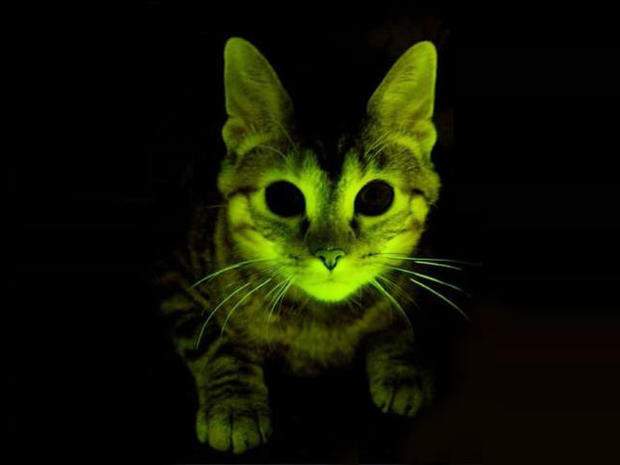Frankenkitties? Scientists say glow-in-dark cats may take bite out of AIDS
(CBS) Can glow-in-the-dark cats help conquer AIDS?
Researchers have created three cats with a gene that makes their cells glow green when exposed to UV light and are hopeful that the fluorescent felines will speed development of strategies to prevent HIV/AIDS in humans as well as a similar disease that strikes cats.
To create the frankenkitties, scientists at the Mayo Clinic inserted into cat egg cells (oocytes) a gene that protects cells against infection with the feline immunodeficiency virus (FIV). To keep track of the "rhesus macaque restriction factor" gene, they inserted a jellyfish gene that makes the cells glow green.
"We did it to mark cells easily just by looking under the microscope or shining a light on the animal," study author Dr. Eric Poeschla, a molecular biologist at Mayo, told Reuters.
It wasn't the first time scientists had created a fluorescent animal. Glow-in-the-dark fruit flies, mice, rabbits, and pigs have already been created, the Guardian reported.
FIV causes AIDS in cats just as HIV does in people - by depleting the body's infection-fighting T-cells, according to a written statement released in conjunction with the study. The restriction factors that occur naturally in cats and humans are ineffective at stopping HIV infection. That's why scientists have been interested in using genetic engineering techniques to equip cats and possibly humans with the monkey restriction factor - which is effective.
The technique used by the scientists - called gamete-targeted lentiviral transgenesis - won't be used directly on cats with FIV or humans with HIV, according to the statement. But it could help doctors and veterinarians understand how restriction factors could be used to develop gene therapy techniques for AIDS in both species.
"This provides the unprecedented capability to study the effects of giving AIDS-protection genes into an AIDS-vulnerable animal," Dr. Poeschla said, according to Reuters.
The research could lead to the development of cats that have "build-in" protection against FIV and possibly other illnesses, the Daily Mail reported. That could reduce the expense and inconvenience of having to take cats to the vet for immunizations. And some people might be interested in purchasing glow-in-the-dark cats just as a novelty, the paper reported.
The researchers say adult cats that have the experimental genes pass them on to their kittens, so there's no need to reintroduce the genes into each new generation.
The experiment was described online in Nature Methods.
